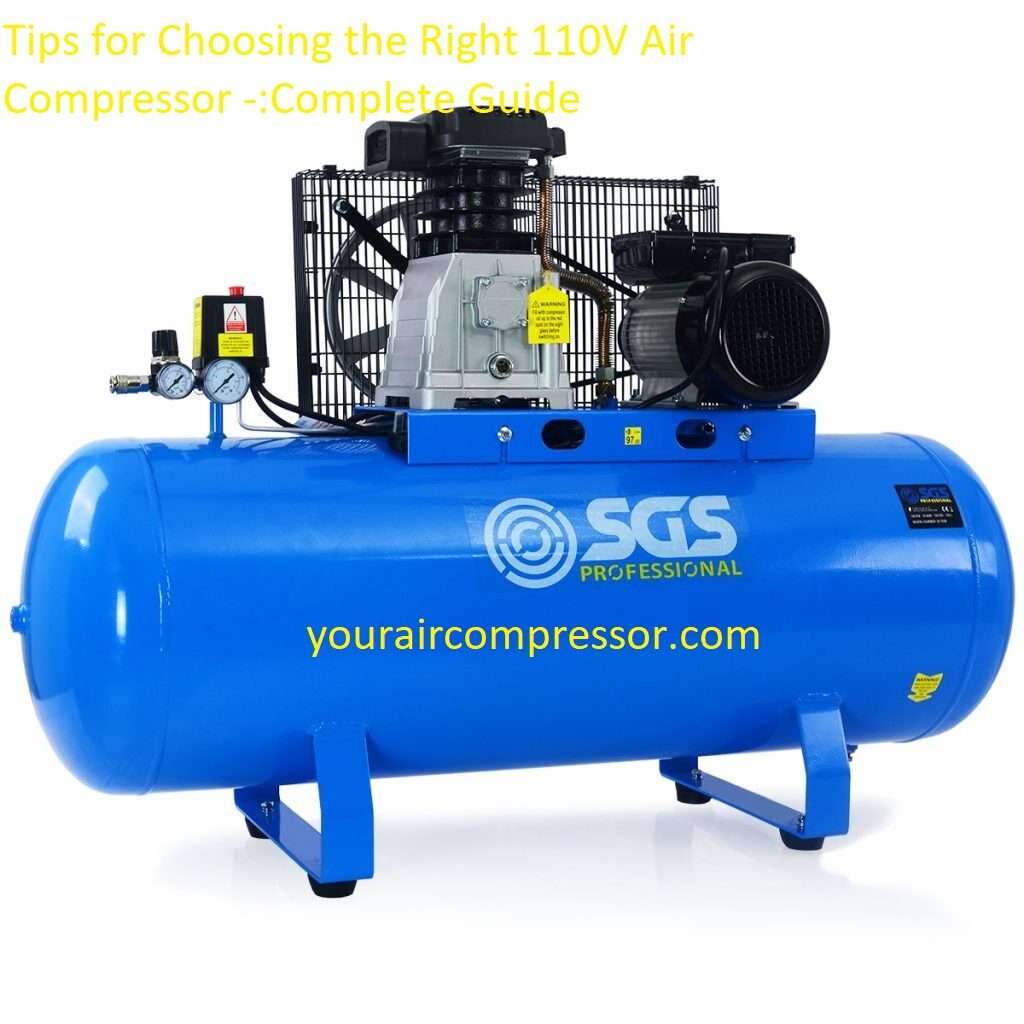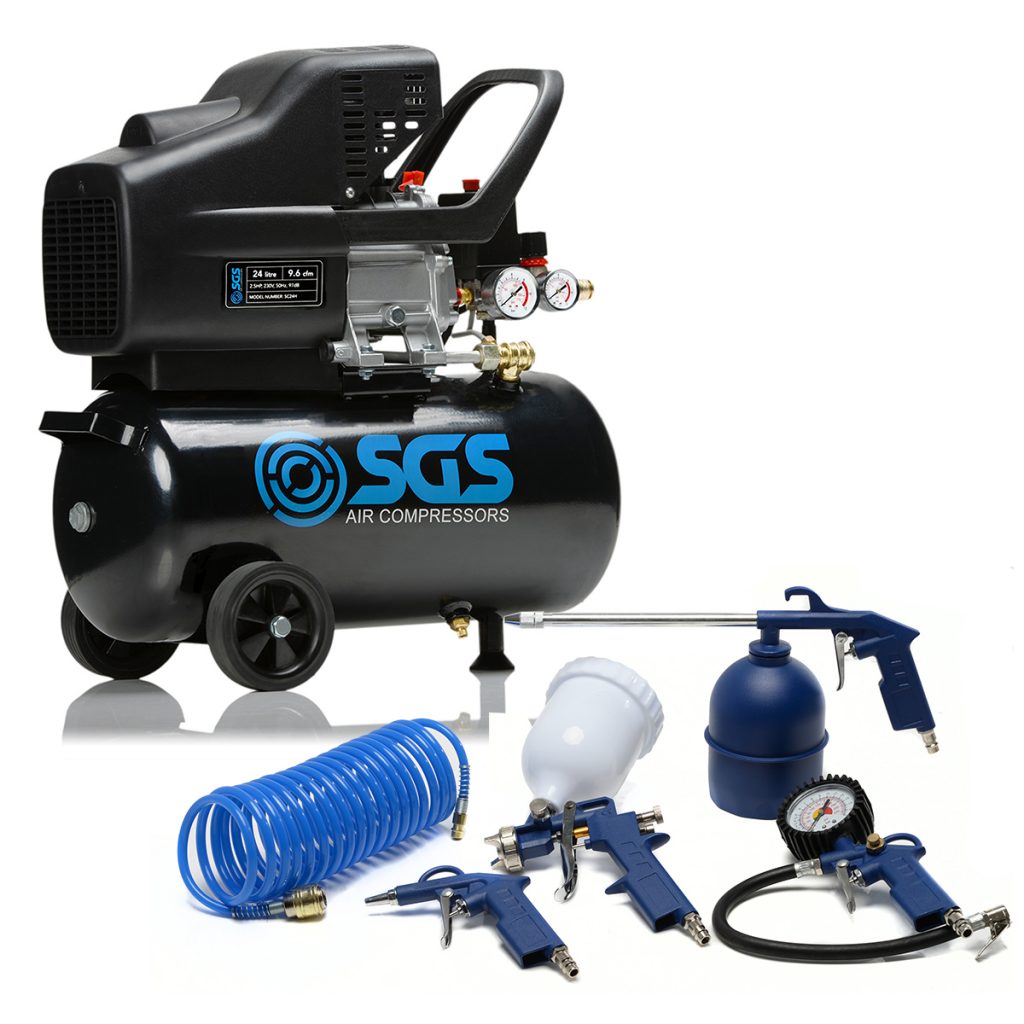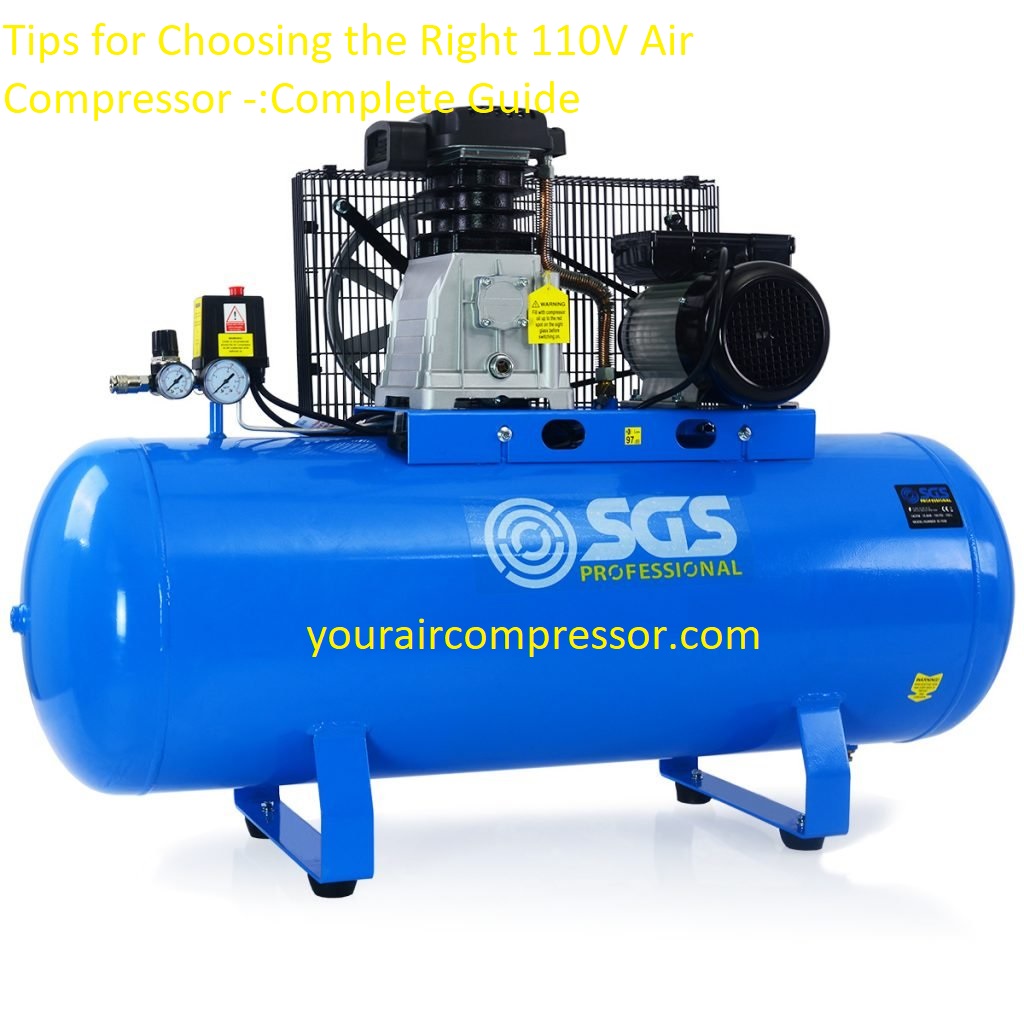 Are you looking for the best 110V air compressor for your project needs? Here is a complete guide to help you choose the right one. You’ll learn about features, types, and best practices when selecting an air compressor for any job. Make sure to read all the way through for expert tips that guarantee success.
Are you looking for the best 110V air compressor for your project needs? Here is a complete guide to help you choose the right one. You’ll learn about features, types, and best practices when selecting an air compressor for any job. Make sure to read all the way through for expert tips that guarantee success.
Ready to get started? Let’s go!
When shopping for an air compressor, it’s important to consider factors like size, weight, capacity, and portability. An 110V air compressor can solve most of your needs in the home workshop or garage. 110V air compressors are lightweight, affordable and run off standard home current. With so many models on the market to choose from, selecting the right compressor for your needs may seem daunting. However by understanding what you need in an air compressor and considering factors such as compressor type and tank capacity, you’ll be able to make an informed decision that fits your budget.
In this guide we’ll discuss the types of 110V compressors available on the market today and explain how to choose one best suited for your needs. We will review the features of six top-rated 110V compressors that bring you robust performance without breaking the bank. Finally we will look at some of the safety precautions you should take when using an air compressor in your home workshop or garage.
Explanation of 110V air compressors
A 110V air compressor is an electrical device that compresses air and stores it in a pressure tank. The compressed air can then be used to power a variety of tools and equipments. 110V compressors are popularly referred to as ‘plug and play’ models, as they are powered directly by a household 110-volt power source.
As compared to its more powerful 220-volt cousins, 110V compressors are easy to use, operate safely with household current, lighter in weight and less expensive. However, they have certain limitations in terms of amount of air output they can generate compared to the more powerful models.
In order to decide which type of compressor is best for your needs, it is important to understand its features. Knowing the specs such as horsepower rating, CFM rating, duty cycle and other specifications will help you pick out the best model for your tasks. To equip yourself with the knowledge required for making an informed decision regarding 110V compressors purchase read on the tips below.
Importance of choosing the right 110V air compressor
A 110V air compressor is an important tool to have in any shop or garage. It can be used for a variety of tasks such as inflating tires, blowing dust off surfaces, cleaning and powering small tools like nail guns and paint guns. The importance of choosing the right 110V air compressor cannot be overstated — the wrong one can be inefficient and annoying to use, or worse, ineffective for the job at hand.
There are many factors to consider when selecting an 110V air compressor such as size, power, noise level, features and price. It is also important to factor in what type of tasks you will be using the compressor for. Will you mostly just need it to blow dust off surfaces or will you also need it for powered tools? Knowing this information prior to purchasing your 110V air compressor will help ensure you have the best model for your needs.
Understanding the importance of having a powerful enough motor is a key factor when shopping for an 110V air compressor — make sure to check for sufficient power (measured in CFM – cubic feet per minute) before buying a unit that won’t meet your needs. Once you have decided on the necessary power output, consider other features like weight and noise levels that may make your decision easier.
Overall, understanding how much CFM output is needed along with any other preferences you may have (noise levels etc.) will help make selecting an appropriate 110V air compressor easier than ever!
Purpose of the guide
This guide provides an overview of choosing the right 110V air compressor, which is an essential component of many tools and machines. It covers a range of topics in order to provide a comprehensive approach to understanding the basics. This includes identifying the type of air compressor you need, selecting compatible accessories, and understanding noise levels and power consumption.
Furthermore, this guide will provide safety tips for when selecting and operating a 110V air compressor. After reading this guide, you should have the knowledge required to confidently choose the right 110V air compressor for your specific needs!
Considerations for Choosing a 110V Air Compressor
In order to choose the best 110V air compressor for your needs, there are several factors you should consider. Here are some important points to consider when deciding which type of 110V air compressor is right for you:
- Power: How much power does the compressor need to have? This is determined by the type of tools or tasks it will be used for. Some compressors may provide more power than necessary for certain tasks, wasting electricity and money, while others may not provide enough power.
- Duty Cycle: What is the duty cycle of the unit? The duty cycle refers to how often and how long a compressor can run without having an issue with overheating or loss of air pressure. This can be especially important if you plan on using your compressor regularly or heavily.
- Air Delivery Rate: What is the air delivery rate of your chosen compressor? Air delivery rate has a direct effect on how quickly a tool will operate when connected to the unit, as well as how frequently the motor has to cycle off in order to cool down and recharge itself before running again.
- Capacity: What size tank do you need? Most portable machines come with reserve tanks measuring up to 3-5 gallons, however larger models are also available for more demanding jobsites and industrial operations that require greater airflow rates over longer periods of time.
- Noise Level: How loud is your chosen machine? The vast majority of tools operate at a very low noise level; however, some may produce considerable sound levels depending on their capacity and motor size – something you should take into account if planning on using your compressor near residential neighborhoods or quiet workplaces where noise must be kept under control at all times.
Purpose of the air compressor
The purpose of a 110V air compressor is to provide compressed air for use with pneumatic tools or equipment. From inflating tires and sports balls to driving a power nailer and other pneumatic tools, 110V air compressors are essential pieces of equipment in a wide range of industries. When shopping for an air compressor, there are several factors you should consider including the type of compression technology, tank size and portable options. Additionally, you should consider whether it will be used as a stand-alone unit or as part of an integrated system.
Depending on the application, you may choose either single-stage or multi-stage models. Single stage compressors can produce air pressures up to 150 psig while dual-location models are designed to produce pressures up to 200 psig. In addition to selecting the appropriate pressure level, tank size is also important. Generally speaking, tank sizes range from 1 gallon up to 80 gallons and they play an important role in providing enough compressed storage for use with various pneumatic tools or equipment.
Finally, many 110V compressors come with portability features such as wheels and handles making them easier for operators to move between jobsites when needed; however, some stationary models may be best suited for facilities that require high pressure levels or extended run times during production shifts. Before purchasing an air compressor it is important that you carefully review all available options so that the final selection properly meets your specific needs and complies with any applicable regulations or standards pertaining to your industry segment or application requirements.
CFM (Cubic Feet per Minute) rating
CFM (Cubic Feet per Minute) rating is a vital and important feature when selecting an air compressor. This rating helps you determine the capacity of the pump, which will influence its performance on the job. The primary capacity rating of any compressor is CFM, and it denotes how many cubic feet of air can be produced per minute. Higher CFM will allow more tools to be used simultaneously and some heavy-duty repairs to be completed with ease.
For example, for nearly all applications except for small inflating jobs like bicycle tires or sports equipment, you’ll want an air compressor that produces 4+ CFM at 80 psi pressure level. Before selecting any model make sure to compare different models from AFT Air Compressors and their various CFM ratings to find a suitable choice for your job requirement.
PSI (Pounds per Square Inch) rating
Pounds per Square Inch (PSI) is a key metric for air compressors, as it determines the amount of air that the compressor is able to pressurize and deliver. Most 110V air compressors come with a standard PSI rating of between 0-150 PSI, although higher-end models are able to generate up to 200 PSI.
When selecting an air compressor, choose one that meets the requirements of your work material and tools. If you’re using tools that require a high degree of power, such as hydraulic or pneumatic tools, choose an air compressor with a higher double-digit PSI rating. If you’re working with lower-impact applications, such as small amount of light sanding or applying paint to an object, select an air compressor with a lower PSI rating.
Generally speaking, always purchase an air compressor with a minimum output pressure level at least 10-15% higher than what is required for your job.
Top Tips for Choosing the Right 110V Air Compressor

When you’re looking for a 110V air compressor, it can be tricky to know which one is right for your needs. But fear not! We have compiled the top tips on selecting the right 110V air compressor for any job.
First, it is important to consider what type of power output is necessary for your particular usage. Different compressor types often have different power outputs, so it is important to match the output requirements with what you need from the machine. For example, some machines are designed specifically for automotive use, and will have higher power outputs than those designed solely for home use.
Next up, you need to consider the CFM (cubic feet per minute) delivery of your chosen compressor. This basically measures how quickly and efficiently it takes in and expels air; an important factor when choosing a compressor for larger projects such as running multiple tools or specific tasks that require sustained pressure over long periods of time.
It’s also wise to consider noise levels when making your decision, as this will depend on wherever you intend to use the equipment: if it’s indoors or outdoors makes a big difference here! Most compressors operate through motors which create noise while running; some are louder than others! Make sure you check out reviews and descriptions of compressors online or in-store before investing in one – this will help inform your decision-making process massively!
Finally – make sure that whatever model you choose has an appropriate warranty scheme backed by a reputable manufacturer/retailer; many brands offer warranties on their compressors which can add peace-of-mind when buying something technical such as this, plus provide protection against damages that could occur due to faulty mechanical components over time – always read through their terms before signing up with them!
Consider the intended use
When selecting the right 110V air compressor for your specific needs, the intended use of the compressor should be a primary factor in your decision. It’s important to assess the type of work you will be doing and how long it will take in order to determine the most efficient and cost effective compressor for your needs.
For instance, if you’re looking for an air compressor to power a lightweight tool permanently fixated to a work surface, such as a nail gun or staple gun, then a lighter-duty model will probably suffice. These low-duty models can meet those basic needs with less effort and risk of overworking the motor.
For heavier-duty tasks like using an impact wrench or running multiple tools simultaneously, you may need to purchase a more powerful 110V air compressor that will run continuously with greater capacity and reliability. Make sure you have checked the output requirements of all applicable tools before buying an increased duty model as more power does not always guarantee better results in this case.
Look for a high CFM rating
When considering the right 110V air compressor for a particular job, there is one important feature to look for: cubic feet per minute or “CFM.” This is the measure of the flow rate of air coming out of the compressor and is a good indicator of how well it will perform under pressure.
Look for an air compressor with a CFM rating equal to or greater than what you need. A higher CFM rating allows you to complete more jobs in less time.
It’s important to note that CFM ratings can vary depending on PSI, so check the product specifications carefully.
Compressors with lower power requirements can deliver high CFM ratings, making them great for running pneumatic tools on a jobsite without having to worry about access to power sources.
Conclusion

In conclusion, shopping for a 110V air compressor can be difficult, but with the right information it is possible to make an informed decision. It is important to choose a unit that meets your needs, fits within your budget and has the necessary safety features. Make sure you do your research before making a purchase and read product reviews if available.
Also, keep in mind that larger compressors require large power sources and that an undersized compressor can cause a overload on the system. With careful consideration of all these factors, you should be able to find the perfect air compressor for any job.
FAQ
How do I choose the right air compressor?
To choose the right air compressor, consider the intended use, required pressure, volume of air needed, power source, and budget.
How do I choose an air compressor size?
To choose an air compressor size, determine the amount of air needed for your tools or equipment, and choose a compressor with a higher CFM and PSI rating than required.
What are the two factors to consider when selecting an air compressor?
The two factors to consider when selecting an air compressor are CFM (cubic feet per minute) and PSI (pounds per square inch) ratings.
What is a good CFM for air compressor?
A good CFM for an air compressor depends on the tools and equipment being used. Generally, a compressor with a CFM rating of at least 2-3 times the tool’s requirement is recommended.
What is more important CFM or PSI on air compressor?
Both CFM and PSI are important on an air compressor, as they determine the volume and pressure of air delivered. However, the more important factor may depend on the specific application.
What is the rule of thumb for air compressors?
A general rule of thumb for air compressors is to choose a compressor with a CFM rating of at least 1.5 times the amount required by the tools or equipment being used.
What is most important in an air compressor?
The most important factors in an air compressor are its CFM and PSI ratings, as well as its reliability, durability, and ease of use.
Which is better a single stage or two stage air compressor?
A two stage air compressor is generally better than a single stage compressor, as it can deliver higher CFM and PSI ratings, and is more efficient for heavy-duty applications.
What is the best compressor ratio?
The best compressor ratio depends on the specific application and the tools or equipment being used. A higher CFM to PSI ratio may be better for some applications, while a lower ratio may be sufficient for others.
Is a bigger compressor better?
A bigger compressor may be better for heavy-duty applications or those requiring high CFM and PSI ratings. However, for smaller applications, a smaller compressor may be more practical and cost-effective.
see also…
- Best Cordless Air Compressor 2023
- Best battery powered air compressor 2023
- Best airbrush air compressor 2023
- Best air compressor under 500 2023
- Best Air Compressor Hoses 2023

